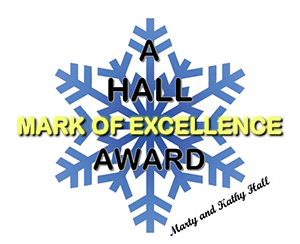
This World Cup coverage is made possible through the generous support of Marty and Kathy Hall and A Hall Mark of Excellence Award. To learn more about A Hall Mark of Excellence Award or to learn how you can support FasterSkier’s coverage please contact info@fasterskier.com.
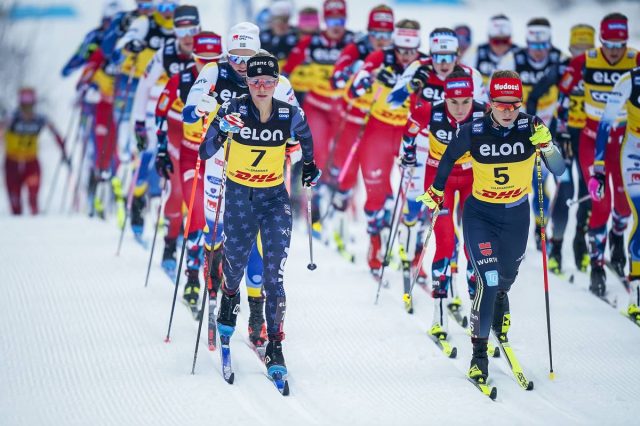
Lillehammer, Norway was the site of the latest event displaying new FIS Cross Country World Cup policies offering equal racing distances for both men and women with today’s 20 k Mass Start Classic event. Sweden’s Frida Karlsson finished first in 53:51.9, followed .6 seconds later by Tiril Udnes Weng (NOR), and 1.2 seconds ahead of Ebba Andersson (SWE). Jessie Diggins (USA) finished 9th and Katherine Stewart-Jones (CAN) 13th on a day that saw the women’s 20 k field stick together, only sorting out the finishing order in the final kilometer. Podium finishers were separated by just over a second, and the top ten finishers were separated by less than 10 seconds.
Other North American finishers included Americans Alayna Sonnesyn (36th), Sophia Laukli (39th), Julia Kern (44th), and Canadian Olivia Bouffard-Nesbitt (43rd) who was forced to recover from a crash that sent her tumbling into trailside powder on Lap 2. Canada’s Dahria Beatty did not finish, while Americans Rosie Brennan and Novie McCabe did not start due to illness.
Originally appearing on the FIS World Cup calendar as a 20 k Skiathlon, today’s event was changed to Classic Mass Start due to limited snow conditions that would not allow the construction of skating trails sufficiently wide enough to meet FIS guidelines. There appeared to be lots of snow in Lillehammer: evidently just not quite enough. Despite the event alterations, the racing did not disappoint.
Women’s 20 k Classic Mass Start
Only three start lanes were available as racers lined up; even so, likely contenders in today’s race were gathered in the front row of starters: Weng wore the yellow FIS World Cup overall leader’s bib, Andersson wore the FIS World Cup distance leader’s red bib, and Karlsson lined up in the third starting position. Diggins started 7th near perennial contender Krista Parmakoski (FIN) who started 10th.
Facing six laps of a 3.3 kilometer course, the skiers opened the race very quickly on the downhill out of Birkebeiner Stadium, with Andersson, Karlsson, and Weng (NOR) moving to the front and dictating the early pace. Andersson continued to lead the closely-bunched field as they looped through the stadium at the end of Lap 1.
“I knew it would be chaotic on such a fast course,” said Stewart-Jones. “So I wanted to be smart with my energy so that I could pick up the pace when the front tried to break. It was really cool to see my tactics pay off.”
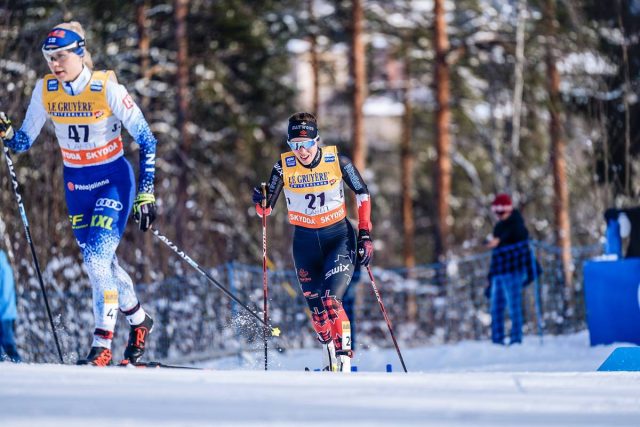
“I wanted to be smart with my energy so that I could pick up the pace when the front tried to break. It was really cool to see my tactics pay off.” Katherine Stewart-Jones (CAN)
Most teams appeared to have managed the kick wax challenges, and the field stayed together in the early laps without too many racers needing to exit the tracks. Diggins moved briefly to the front at the beginning of the significant climb on Lap 2 in what would become her pattern throughout the day: move forward on the climbs while allowing the Swedes to set the pace. Through two laps, Alayna Sonnesyn (USA) and Sophia Laukli (USA) remained tucked efficiently within the main field, though by Lap 3 Diggins and Stewart-Jones were the only North Americans remaining in contention. Chase groups were forming, but the main field of 17 had definitely established a gap.
Through the middle laps, pace-making duties were traded among a number of contenders—Andersson, Hennig, and Karlsson—always closely marked by Weng and the Finns, Krista Parmakoski, Kertu Niskannen. Diggins and Stewart-Jones stayed within the ever-shrinking main field, carefully adjusting their positions, staying out of trouble, and always avoiding the back of the pack where they might’ve been susceptible to being dropped whenever the pace heated up.
“I knew that people would try to break away on the big climb or going through the stadium,” said Stewart-Jones. “So, I expected that those sections would be really hard. My skis were really fast today so I knew that if I could stay in contact on those sections, I would no problem with the downhills and would get some recovery.”
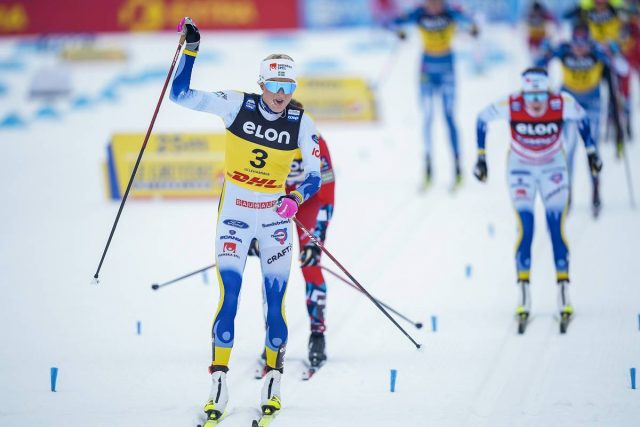
Karlsson attacked through the stadium at the beginning of the final lap, a bold move undertaken with more than three kilometers to go. No team tactics were on display today, as Andersson—Karlsson’s Swedish teammate—led the chase to reel in Karlsson who began slipping on the hill. Hennig joined the chase, and a group of three (Karlsson, Andersson, and Hennig) formed by the top of the climb, to be interrupted soon after when Hennig broke her own pole on a misplaced herringbone stride. Coaches quickly replaced her broken pole, but the damage had been done as Andersson and Karlsson escaped without her.
Thirteen skiers (including Diggins and Stewart-Jones) were still in contention at the base of the final hill before the stadium, but Tiril Udnes Weng disrupted the field by surging up the climb to slot in behind Karlsson who had already begun her double-poling push toward the finish line. While Weng appeared to have the faster skis, Karlsson definitely had the faster tempo, and they remained 1-2 all the way to the line. Ebba Anderson finished just a second behind them.
Diggins skied across for 9th, while Stewart-Jones finished 13th, only ten seconds behind the winner. Stewart-Jones finish was a great result for Team Canada, building on fine performances from last week in Ruka, and extending even into performances by Canadian athletes in the men’s field in Lillehammer. When asked about his team’s progress, Canadian Coach, Robin McKeever, credited team dynamics and the supportive atmosphere of Team Canada. “I believe in creating a team, much the way Matt Whitcomb has done in the United States: focusing on the team first, working for each other,” McKeever said. “It’s about maintaining balance and composure, and creating an environment where every skier can do their best.”
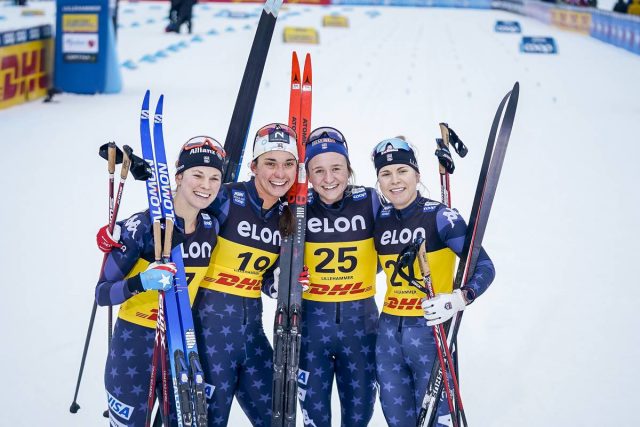
John Teaford
John Teaford—the Managing Editor of FasterSkier — has been the coach of Olympians, World Champions, and World Record Holders in six sports: Nordic skiing, speedskating, road cycling, track cycling, mountain biking, triathlon. In his long career as a writer/filmmaker, he spent many seasons as Director of Warren Miller’s annual feature film, and Producer of adventure documentary films for Discovery, ESPN, Disney, National Geographic, and NBC Sports.



